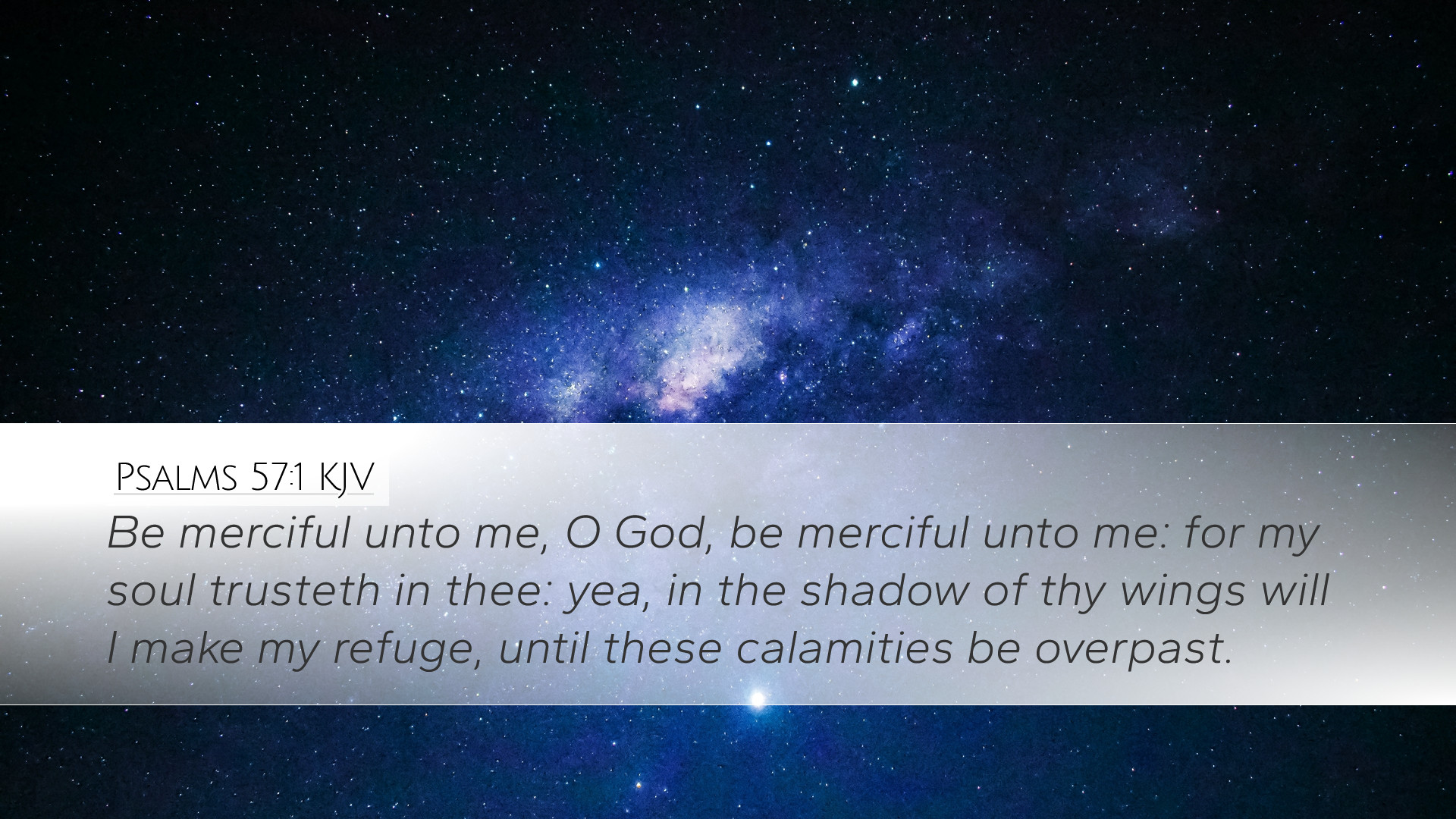Commentary on Psalms 57:1
Verse Text: "Be merciful unto me, O God, be merciful unto me: for my soul trusteth in thee: yea, in the shadow of thy wings will I make my refuge, until these calamities be overpast." (Psalms 57:1)
Introduction
Psalms 57:1 is a plea for mercy and protection amidst distress. It exemplifies the profound trust in God of the psalmist, who seeks refuge under divine wings. This verse serves as an invocation of God's grace and the assurance of His shelter during times of adversity. The commentary synthesizes insights from various public domain sources, providing an in-depth exploration for pastors, students, theologians, and Bible scholars.
Thematic Overview
- Human Vulnerability: The psalmist acknowledges his vulnerability and dependence upon God.
- The Nature of Divine Mercy: Emphasizes the essential quality of mercy in God's dealings with humanity.
- Trust and Refuge: The metaphor of God’s wings illustrates protection and safety in times of danger.
Exegesis of the Verse
The verse begins with a repetition of the plea for mercy: "Be merciful unto me, O God." This repetition highlights the intense urgency of the psalmist's situation. Matthew Henry notes that such earnestness in prayer signifies deep distress—his soul is in turmoil, and he seeks refuge in God's compassion.
Albert Barnes emphasizes that the trust expressed—"my soul trusteth in thee"—indicates a deep-seated faith. The trust in God is contrasted against the backdrop of calamities that the psalmist is facing, illustrating a profound relationship between human frailty and divine faithfulness.
As Adam Clarke points out, the imagery of "the shadow of thy wings" is drawn from the natural world, where birds protect their young. In this medieval understanding, as mothers shield their chicks, God shields His people; thus, this metaphor serves as both a comfort and an assurance of safety. The reference to "until these calamities be overpast" underscores a temporary situation of distress and points toward hope for deliverance.
Contextual Analysis
This psalm is part of the greater context of David's life, particularly his flight from Saul. The expression of trust amidst trial reflects a broader biblical theme of reliance upon God in hardships. Matthew Henry relates this setting to our own challenges, interpreting the psalm as applicable for Christians suffering persecution or trials of any kind.
By exploring the Hebrew terms used within this verse, we uncover layers of meaning that enrich our understanding. The term for "mercy" ('chesed') communicates not just a request for kindness but also a plea for God’s unfailing love and steadfastness.
Theological Implications
- God’s Character: This verse reaffirms God's attributes of mercy and faithfulness, central themes of biblical theology.
- Human Dependency: It emphasizes the ongoing reliance on divine help, a consistent thread through the entirety of Scripture.
- Refuge and Safety: The metaphorical language of refuge points towards Christ as the ultimate shelter for believers.
Practical Applications
For pastors and theologians, Psalm 57:1 offers a rich resource for preaching on the topics of reliance on God during trials. It serves as a reminder of the importance of prayer in times of distress and reaffirmation of God’s merciful nature.
Students of Scripture can delve into this verse as a meditation on divine mercy, considering how they can operationalize trust in their daily lives, especially in uncertain times. Adam Clarke's insights encourage believers to seek God as their refuge continuously, not only in crises but as a daily practice of faith.
Furthermore, the imagery of protection under God’s wings can be adapted as a powerful visual in pastoral care situations, providing comfort to those in need of assurance during difficult times.
Conclusion
Psalms 57:1 encapsulates a heartfelt cry for mercy, revealing human vulnerability and God's comforting presence. Through a careful analysis of the Psalm, the depth of trust, the richness of mercy, and the depth of imagery is revealed. This commentary draws from the cherished wisdom of Matthew Henry, Albert Barnes, and Adam Clarke, offering an integrated perspective that emphasizes God's faithfulness and the intimate relationship believers can have with Him during life's upheavals.


